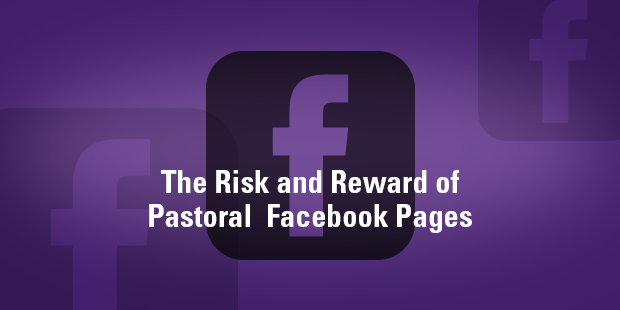
The Risk and Rewards of Pastoral Facebook Pages
While advocating for social media and online engagement by pastors and church staff, I’m continually asked about parameters for engagement. The problem is that every situation is unique. There’s not a one-size-fits-all recommendation for social media and online engagement by pastors and church staff.
Facebook is different than Twitter, and both of those are different than the world of blogging. Since Facebook is the most popular platform, it is often the most used and most abused by church members. A pastor or church staff member on Facebook can be a valuable resource to church members as well as a big target.
The Pros
There are many positives for pastors and church staff who are active on Facebook.
- Your members are there. Because it’s the most used platform, your church members are likely to be there, too. It makes communication easier for you and the church.
- Your members can see that you have a life outside of church. Because of the ease of sharing pictures and events from your everyday life, members can get to know more about you as a person. They get to see that you have a life outside of your job at the church.
- You are easy to connect with and contact. Because of the ease of connection on Facebook, church members and community members can connect with you and, by extension, the church. Facebook can become a great outreach tool if you connect well with those in the church and community through its platform.
The Cons
Ironically, the positives that Facebook can bring you online can also be negatives.
- Your members are there. Church members can see everything you say or do online. Things can easily be misconstrued, misinterpreted, or misrepresented. I’ve seen something as simple as changing ones profile picture lead to an inquisition about searching for a new job.
- Your members can see that you have a life outside of church. Churches are often busy. Church staffs are often even busier. But what about that one event not in your area of ministry that you choose not to attend? The one you skipped for your kid’s play or for a trip with lifelong friends? You can almost expect someone to be upset you chose something else over him or her. It’s not fair. It’s not right. But it will likely happen.
- You are easy to connect with and contact. For many pastors or church staff members, their busiest time on Facebook is often Sunday mornings. People often post or message them about being out of town or being sick or needing someone to fill in. Because of the ease of access, Facebook connections are subject to abuse by church members at times.
You might expect me to weigh the pros and cons and determine whether or not you should be on the platform—but that is for you to decide. As for me, even with the cons, the positives of Facebook and the opportunities it presents for ministry far outweigh the temporary frustrations of the negatives.
Learn more about the power of social media for your ministry. Connect with an Auxano Navigator.

Tags: Facebook, Jonathan Howe, pastors on Facebook














